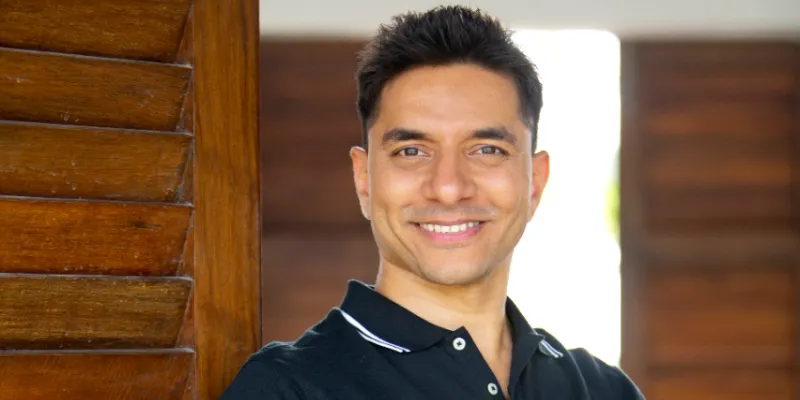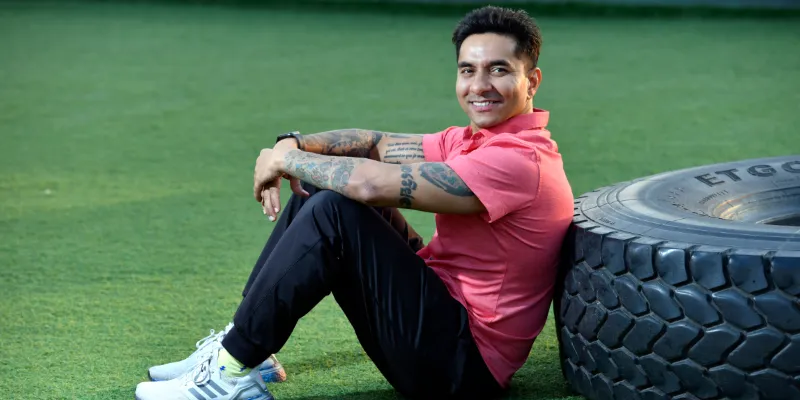What stops India from becoming fit? Fitness guru Luke Coutinho answers
Fitness and wellness guru Luke Coutinho deep dives into his stint as an entrepreneur, on holistic wellness, social media and its impact, what stops India from becoming fit, and much more.
“Unfortunately, it took a pandemic for immunity to become a buzzword,” says fitness guru and nutritionist Luke Coutinho on the impact of COVID-19 on people.
Luke Coutinho wears many hats. He started his journey as a nutritionist but then moved on to other fields as well because “nutrition alone cannot fix the health problems that we have in the world”.
He is involved in integrative and lifestyle medicine as well. Luke has also co-authored two books with celebrities Shilpa Shetty and Anushka Shetty. Another one with actress Tamannah Bhatia is on the cards.
He is the co-founder of RESET, a holistic wellness centre in Mumbai, Lifeness Science Institute (LSI). He is also the co-founder of ecommerce platform GOQii. Luke has also been conferred the ‘Fit India Champion for Lifestyle and Wellness’ title for the Fit India Movement, an initiative of the Indian government, which was launched by Prime Minister Narendra Modi in 2019.
He says that the next big challenge is going to be finding good food. In fact, he has launched Luke’s Wellness Market, an ecommerce platform to meet India’s need for healthy food.
In an interview with YS Weekender, Luke discusses his stint as an entrepreneur, holistic wellness, social media and its impact, what stops India from becoming fit, and much more.
Edited excerpts from the interview.
YS Weekender [YSW]: How did you jump into entrepreneurship?
Luke Coutinho [LC]: I started as a nutritionist and then moved into lifestyle because I felt that nutrition alone cannot fix the health problems that we have in the world. Doctors treat symptoms, nutritionists teach people how to eat food.
But the biggest issue is the overall lifestyle and the biggest gap is every expertise in the healthcare space is working in their own silos. Everything is fragmented. So, I moved into integrative and lifestyle medicine as well because I wanted to put everything together.
Today, when patients come to us, they get treated with the right nutrition, medicine, sleeping habits, emotional wellness techniques, and exercises that suit them.
We have built our businesses based on not just helping them fix their diseases but also their lives.
Then, we realised that if food is medicine then the next biggest challenge would be where to get good food from? Additionally, our vegetables and fruits are sprayed with pesticides, the animals are fed with chemicals, etc.
So, we started Luke’s Wellness Market so that farmers can present their fresh produce on our ecommerce website with no middlemen involved.
YSW: You have been involved in the health and wellness space for a long time. From your experiences, what have you been able to gather about holistic well being and lifestyle?
LC: When we talk about holistic wellness of a person, it's the way you eat, the time you eat, the quality of your food and whether the exercise you do is suiting you or not. Other factors like sleep and rest also matter a lot.
Holistic wellbeing also includes your emotional wellness as well. Are you too stressed? Are you constantly depressed? Are you keeping some negativity in your life?
And finally, it is your environment. If the environment you live in is polluted and toxic, there's no way you can achieve holistic wellness.

YSW: India has the best doctors and nutritions and remains a leader in diseases like diabetes, heart diseases, cancer etc?
LC: India leads the world when it comes to diabetes, heart diseases, and cancer. One in four people are diabetic, one in four have high blood pressure, another two have a migraine, kidney problems, and there are many more examples.
We beat China and even the US. And, this is strange because we have top doctors, nutritionists, gyms, and superfoods available in the country.
The biggest gap lies in us treating only symptoms, in the sense, we have only been prescribing pills for symptoms. We have to address the root causes and bring about a change in our lifestyle to improve our health and overall well-being.
If you only address the symptom, you will eventually develop chronic sickness, which is huge in our country. So, people are getting sicker and they continue to stay sick because only their symptoms are being treated and we're not addressing the underlying cause, which is their lifestyle. This is exactly where holistic wellness needs to come in.
YSW: A lot of people argue that they don’t have enough time to exercise or for themselves...
LC: This a matter of choice. Not having enough time is not the issue. Where there is a will, there is a way. Some of the busiest people I know (who are also successful) make time for exercise and are healthy.
It all comes down to what you assign value to, or your health. Similarly, if you assign more value to your growth in your company alone and less to your health you will burn out.
I know people who travel four hours to go and come back from work, but they still find 30 minutes a day to do a walk or to do some other exercise. It's a big misconception because finally, it is a choice we make. So, I want people to break this mindset.
YSW: What can organisations do to ensure the well-being of their employees since most people spend much of their time in offices, working?
LC: A lot of companies in India provide full-body check-ups and health insurances for employees. But that's just one percent of the game. There's a lot more that companies can do.
Number one, they need to genuinely care for their employees and not let it become something that is on the to-do list of the Human Resource.
Number two, they have to insist on finding ways to ensure work-life balance among their employees. Most people working in a corporate ecosystem today are sick because they are too stressed or stretched beyond their limits. This leads to eating the wrong food, not exercising, not being able to sleep etc. As a result, their emotional wellness is all over the place.
Companies need to get their employees into genuine programs which helps them, for example, calculate their steps. They can also organise competitions within the company, focus on incentivising employees who are healthy or who exercise, have a dashboard showing sleep patterns of employees within the entire company or take help of technology to see whether everyone is drinking enough water.
Corporates need to understand that investing in the health of an employee is a benefit for them which will in retrospect reflect positively on their top line and bottom line. When employees will feel the difference in their lives as a result of all the initiatives the company takes, they have greater loyalty towards their employers.

YSW: Social media has also disrupted the way of life of a lot of millennials and teenagers. There is a lot of pressure to look good, stay slim, have all materialistic things in place. Your thoughts?
LC: Today, most people are connected outwards. They lay too much emphasis on other people's opinions, the latest trends on social media. As a result, they keep reacting to every change that happens.
Because of social media, people have too many platforms to constantly compare their lives to other people and blame and complain about what is missing. And this is leading to an increase in the number of depression and mental health cases.
When people will start looking inside more, start connecting internally, and have a mind of our own to guide them through problems, we will see a decrease in mental health problems.
YSW: How has the coronavirus pandemic made people more aware of their health?
LC: We have been trying to teach people the importance of immunity for years. But unfortunately, it took a pandemic for immunity to become a buzzword. I think everyone should look at this virus with a perspective of what we can learn from it? And what do we need to change in our lives? The underlying lesson is we are not stronger than nature.
We can produce some great tools in the fields of technology and our science but we must never disrespect nature or our own intelligence of our human bodies when it comes to our health.
We have a lot of patients come in because now suddenly everyone is interested in prevention and immunity.
YSW: Personally, what are things you are looking forward to in the coming times?
LC: We are looking at expanding the food business. We are also going to start training and putting our doctors and nutritionists across different states in the country so that people can connect with them on a one on one. This will enhance our reach.
We are already present in New York, California, London, Dubai, Australia and we plan to continue our expansion.
And we will continue to incorporate our vision of educating people and creating awareness about prevention and transforming their lives from a 360-degree perspective.
Edited by Saheli Sen Gupta









